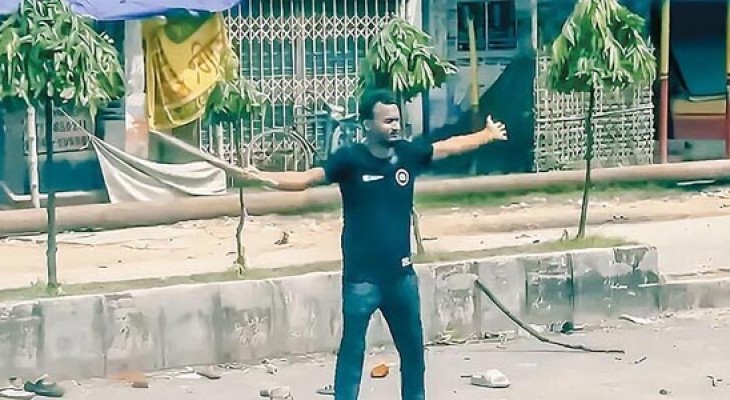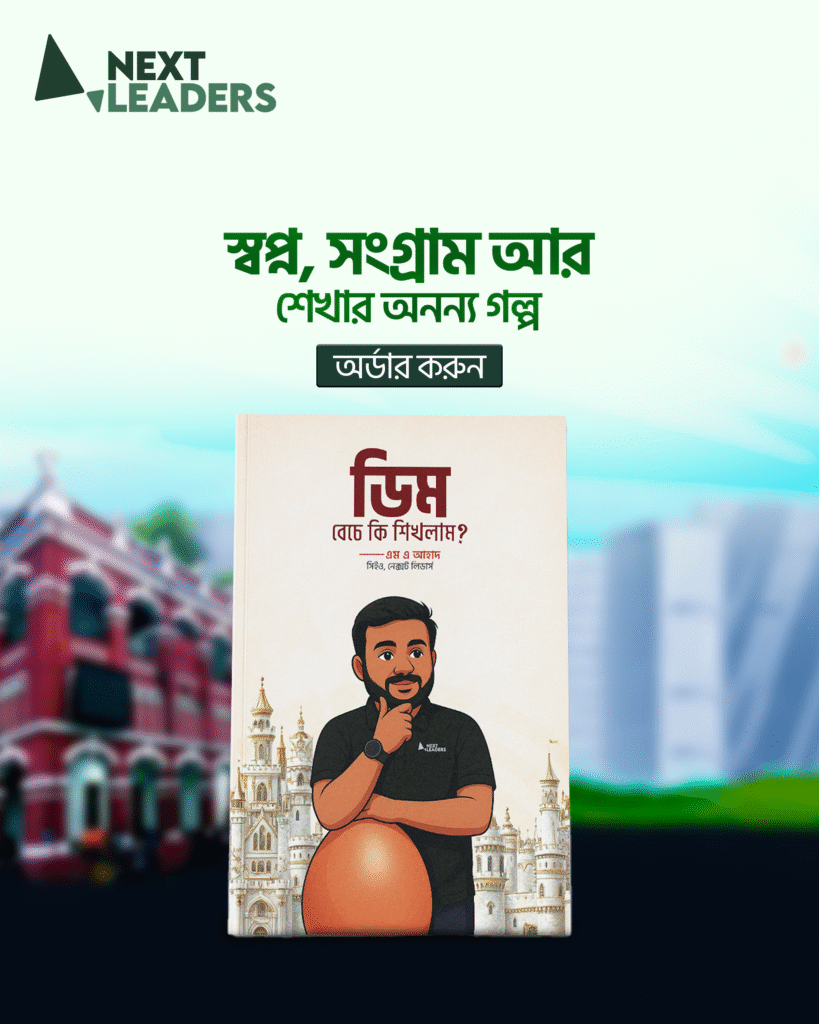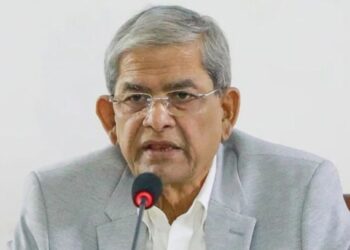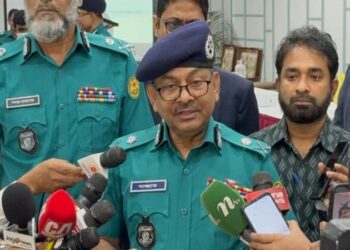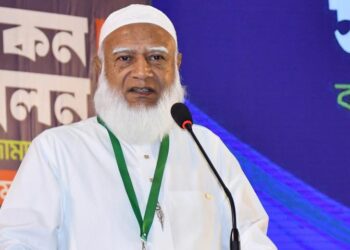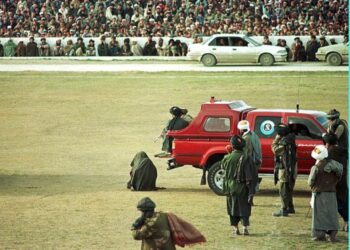Today marks the first death anniversary of Abu Sayed
Today, July 16, 2025, marks a poignant day for Bangladesh as we observe the first death anniversary of Abu Sayed, the heroic martyr of the historic July Mass Uprising. His sacrifice, a year ago, became a powerful catalyst, igniting the flames of protest and demanding a fundamental shift in the nation’s political landscape.
A Stand Against Brutality
On that day, a young man was captured on camera standing almost fifty feet away from a line of armed police officers with his arms outstretched and his chest covered. With one hand he held a stick. Defiant in the other.
On that fateful day, as police brutally beat protesters, many were forced to retreat. But amidst the chaos, Abu Sayed stood his ground. There was no threat in his posture, no aggression in his stance – just the stubborn will of a young man who was unwilling to yield.
Even as others dispersed, he remained unwavering, a solitary figure of defiance against the brutal force. This act of profound courage, this refusal to surrender, made him the first martyr, forever etching his name into the heart of the uprising.
Abu Sayed, a name that resonates with courage and unwavering commitment, fell on this day last year amidst the fervent demonstrations that swept across the country.
While the full story of the July Mass Uprising is still being written in the archives of Bangladesh’s history, Sayed’s death served as a stark and tragic reminder of the human cost of the struggle for justice and greater democratic freedoms.
A Resting Place in Babanpur
Babanpur, a peaceful village in the western region of Pirganj, Rangpur, is where Abu Sayed now lies in eternal peace. As a modest reminder of his sacrifice, his cemetery is located fairly close to the recently paved road.
He was among the first people in Rangpur to organize the movement. He was quiet, determined, and intensely idealistic, according to his Begum Rokeya University classmates.
It is encircled by lush fields where birds continue to sing and a soft wind delivers the reassuring aroma of rice that has ripened. This calm environment provides a peaceful area for reflection and allows visitors to sense the unwavering spirit of a man who sacrificed all for his nation.
His demise, far from quelling the uprising, instead fueled its momentum. It galvanized countless citizens, from students and laborers to professionals and activists, to join the movement, transforming widespread discontent into a unified and formidable force for change.
The image of his sacrifice became a symbol, reminding everyone of the stakes involved and the urgent need for a more equitable and representative society. As we reflect on this somber anniversary, it is crucial to remember not just the circumstances of his death, but the ideals for which he stood.
Read More: Hasina’s Commando Forces Ready to Protect Mujib’s Shrine
There was Abu Sayeed’s final public message, written just hours before his death during the July Mass Uprising. He posted it late at night, knowing very well the danger he was walking into. His words reflect a deep sense of purpose, sacrifice, and foresight. He wrote this not out of fear, but as a farewell and a declaration in case he didn’t survive the next day’s protest.
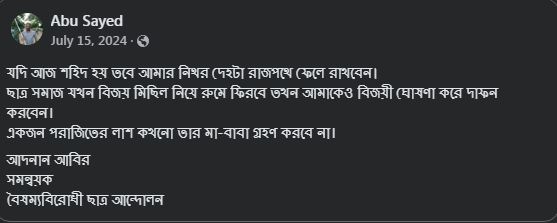
This post became a historic statement turning his death into a symbol of youth struggle and truth.
Truth Brought to Light
At first, the truth was hidden. But after Hasina’s government fell, the case was reopened and what came out shocked the nation. It was not rioters or outsiders who killed Abu Sayeed. It was the police.
Later, a powerful investigation by Drik Picture Library and UK-based Forensic Architecture used satellite images, heat maps, witness interviews, and videos to piece together what really happened that day.
Their findings were clear and heartbreaking: Abu Sayeed was intentionally shot with birdshot a type of ammunition that should never be used for crowd control. He was shot from exactly 14.22 meters away. Two policemen pulled the trigger. One young life was lost.
The investigation exposed the truth and directly challenged the prime minister’s earlier statements. It wasn’t just a killing — it was a cover-up. An attempt to erase not only a person but also the truth, the meaning, and the responsibility.
Even the United Nations couldn’t stay silent. In a rare public comment, the UN Human Rights Office (OHCHR) confirmed what people had long believed: Abu Sayeed’s death was an extrajudicial killing. They called it a reckless use of force and a serious violation of human rights.
Abu Sayed’s ultimate sacrifice underscores the inherent risks faced by those who dare to challenge the status quo and demand accountability. His memory serves as a beacon for all who strive for a just society, reminding us that progress often comes at a steep price, paid by individuals like him who believe deeply in a better future.
While the July Mass Uprising has undoubtedly shaped the course of events in Bangladesh over the past year, it is imperative to continue the work that Abu Sayed’s sacrifice helped to initiate. His legacy calls upon us to remain vigilant, to uphold the principles of democracy, and to ensure that the aspirations for which he laid down his life are not forgotten.
A Symbolic Honor
In a powerful gesture, the interim government has officially declared 16 July as Shaheed Abu Sayeed Day. It is now one of three national days that remember the July Uprising and its martyrs.
To keep his memory alive, Begum Rokeya University has organized memorial events, introduced scholarships in his name, and launched a student debate championship inspired by his courage and ideals.
Today, as we remember Abu Sayed, let us not only mourn his loss but also recommit ourselves to the pursuit of the ideals that he embodied. His name will forever be etched in the history of Bangladesh as the first martyr of a pivotal movement, a testament to the enduring power of courage and conviction in the face of adversity.

